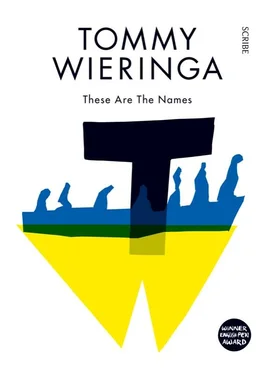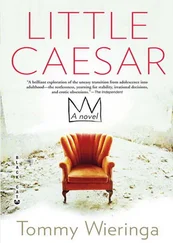Afterwards they fell asleep again around the stove.
Outside, in a bag on the doorpost, hung the thing that had led them to this abundance. They nodded to it upon leaving or entering the house, and murmured words of thanks.
Sometimes the woman knelt out front, laying a wreath of charms and incantations around the doorway. None of them doubted the power the head emanated. They had expelled the black man and killed him by orders of an implicit group will; now they lived on intimate terms with his head. It lived; it sent signals. The woman understood his messages, and arranged them into a tightly knit cult. The others followed hesitantly. Even the most stubborn atheist among them, the man from Ashkhabad, sank down before the head and raised his thoughts on high.
Vitaly was the only one who didn’t take part, rarely emerging from the mist of his ghost realm.
The poacher paid respects to the head in the same even-keeled way he did everything: with dogged conviction and to the exclusion of anything that might distract him. He talked at times about the thicket of horrors, the never-ending suffering at the hard hand of circumstance. You had to steel yourself; you had to learn how to bear up.
They spoke quietly to the head, each on their own, beneath their breath and unintelligibly to the others, jointly sounding like a dull buzz. Along that humming, resonating web they sent him their dreams and lamentations by airmail — their supplications for a good end to their journey.
The chicken lady stepped around the bowed figures on the little wooden porch and went on living imperturbably, as though nothing had happened. They heard her voice only when she called her chickens; she spoke to them in soothing sounds in which no human language could be discerned.
Inside the little house, the lady and the new inhabitants slipped past each other like fish in a pond; whenever someone asked her the name of the village or where the other villagers had gone, she was so startled that after a while they stopped asking at all.
The poacher had found tyre tracks outside the village. The deep, frozen ruts disappeared in a westerly direction, in a route crossed by other tracks here and there. The village was being visited from time to time by someone with a jeep — someone who brought the chicken lady her supplies.
The poacher stood staring worriedly at the graphite-grey sky to the north. A growl of disapproval rose from the back of his throat. They had talked about it before — about whether, and if so when, they should move on. They would have to be quick about it now, the poacher said, before the tracks disappeared under the snow.
Now he and the boy were standing beside each other at the edge of the village. The hard-frozen grassland stretched out before them, white and crackling with cold. The poacher scratched at his beard and squinted. His eyes fixed on something in the distance, he said: ‘We can’t wait any longer.’ The steam from his nostrils scattered quickly.
‘So?’
‘So I’m leaving tomorrow morning, early.’
He turned and walked through the tall grass back to the house. The boy watched him go, his chest filled with impotent rage at this desertion. The poacher could leave them behind without a trace of regret. Before the day was done he would have forgotten them. He lived with his eyes on the horizon, tolerating the others with the patience of a pack animal.
The woman and the man from Ashkhabad had pressed to stay longer, to regain their strength, but the boy had more confidence in the poacher’s common sense. If the snow came, they would be stranded in the chicken lady’s house, without enough food to survive the winter.
‘And what about Africa?’ the boy yelled after the poacher.
He turned. ‘He’s for the living,’ he shouted back, and was lost from sight.
That evening, the poacher prepared his journey. He sewed two burlap bags together. He would carry them over his shoulder. The bottom was tied to his waist with a rope, so the bags wouldn’t get in the way as he walked. He filled them with canned food and a jar of blanched vegetables. In the light of the oil lantern, he looked like the ghost of some saint. He worked silently and efficiently. When he removed the satchel from his shoulder and vanished into the frozen night, the boy said: ‘We’re taking Africa with us.’
‘No you’re not,’ the woman said.
‘He’s already gone.’
He was right: the head had disappeared.
The poacher came in with a couple of chickens in a sack. He wrung their necks and began plucking them, paying no attention to the woman’s angry looks. At last she said: ‘Where is he? Give him back — he’s ours.’
‘Snow’s coming,’ the poacher said without looking up from his work. ‘The living are moving on; the dead will stay here.’
‘There, out there, that’s exactly where death is,’ the woman shrilled. ‘Walking without knowing where you’re going, that’s death!’
The poacher shook his head slowly. ‘He serves the living. Fine if you people want to stay here, but how are you going to survive for four or five months with only enough supplies for one person? There are only a couple of chickens left. The rest are in this bag. So you do the arithmetic.’
Now the boy left the room. He took a few steps outside, and the cold snapped at his legs. Feeling his way, he went into the coop, the tingling odour of chicken shit and sawdust in his nostrils. One foot in the front of the other, he shuffled through the darkened coop until he got to the roost. He tried to feel which ones were the fattest; he had no use for scraggly pullets at this point. Slowly, so as not to startle the huddled hens in their sleep, he lifted the first one from the roost. Clucking quietly, the bird slid to the bottom of the sack. ‘I am death,’ the boy whispered. ‘I come by night.’
He took four chickens, and closed the coop behind him. The earth crunched as he walked past the bare poplars to the house. The chimney smoke rose against the frozen opaline glass of night. How would they survive these nights out on the steppe? They would freeze to death, their rock-hard corpses impervious to bacteria and predators. Only in spring would the snow and frost release their corpses, the sun shining in their dead eyes …
No! He had to have faith! The black man would help them, just like he’d helped them before. The Ethiopian would point the way, and they would reach the civilised world. He wasn’t afraid. He wouldn’t be afraid. Don’t be afraid. He had come this far already …
In front of the stove, he wrung the birds’ necks, plucked them, cut them open, and pulled out their guts. The house floated on the aroma of frying chicken. The woman and the man from Ashkhabad were united in a stationary covenant, running doubtfully through their options. Vitaly lay sleeping beside the stove. The chicken lady was snoring in her armchair.
‘I think,’ the man from Ashkhabad said to the woman at last, ‘that we should go along. There’s no other way.’
‘Why?’ the woman shouted. ‘We could … maybe someone will come along. For her, someone who … family, her children?’
‘Those victuals were fresh,’ the poacher said from across the room.
The boy piled the last of the supplies on the counter, and took his share. The man from Ashkhabad began to move. He gathered clothing and put it on, layer by layer. The boy, too, grabbed pieces of clothing from the piles on the floor. A competitive eagerness arose, the start of a conflict over a pair of woollen tights the boy had his eye on, and then the man from Ashkhabad pulled back his hand.
Sulking, the woman began preparing for what would be the last stage of their journey. She didn’t want to stay behind on her own. The prospect of slow death by starvation frightened her more than dying under the wide-open skies, on the vast steppes.
Читать дальше











